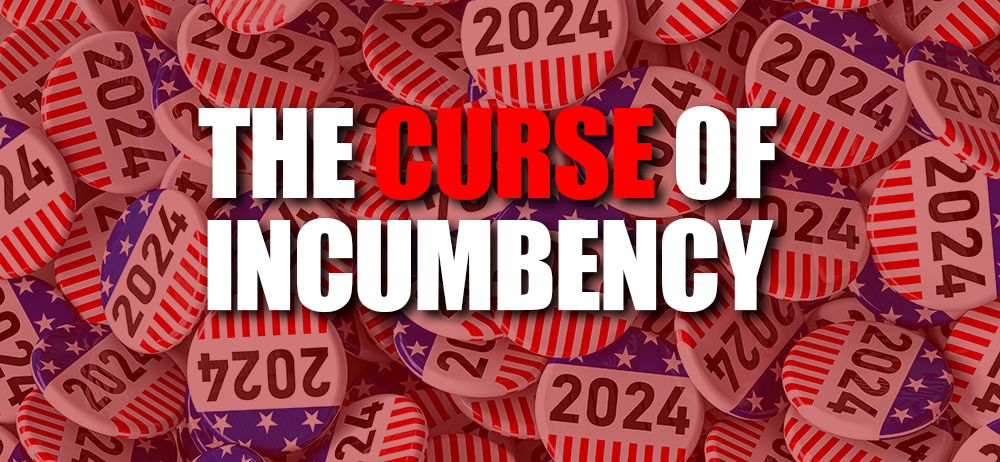28 Nov The CURSE of Incumbency

Key Takeaways From a 107-Day Campaign
“Don’t let anyone tell you something is impossible, just because it’s never been done.”
—Kamala Harris
“After he fails, he draws his lessons, corrects his ideas to make them correspond to the laws of the external world, and can thus turn failure into success.”
—Mao Zedong
KAMALA HARRIS BEGAN TO GET THE IDEA OF THE “UNDERDOG”: Plus, a consistently impressive practice and workshop discipline raised her game to a homerun convention acceptance speech and the most decisive defeat of an opponent in modern US presidential debate history.
BUT . . . HARRIS’ INNATE RISK AVERSION AND BIDEN LOYALTY ENSURED DEFEAT: Harris’ career was built on taking incrementally careful chances—rather than bold risks. And her single defining mistake came on October 6th, on ABC’s “The View,” see this link, when asked: “Would you have done something differently than President Biden during the last four years? Her response began: “There is not a thing that comes to mind.” And with President Biden’s approval rating at a lowly 40%, this was a critical missed opportunity to answer the defining question Harris should have practiced hundreds of times. Historically, this loyalty dilemma is the central reason few US vice presidents become president.
107 DAYS WAS NOT ENOUGH TIME FOR HARRIS TO CHANGE HERSELF OR TO STAND FOR CHANGE: While Biden’s last-minute departure from the race deserves fundamental blame, and while Harris grew significantly stronger as a candidate, following her decisive debate victory there was no second or third act. In the context of 74% wrong track numbers, in an election about change, when Americans, like most global electorates, wanted a change leader and problem solver, Harris on November 5th represented more of the same.
THE “3 Is” KILLED HARRIS: IMMIGRATION, INFLATION, AND INCUMBENCY: The Biden Administration lost control of the Immigration issue four years ago; and ceded the Inflation dialogue two years ago. But ultimately, most damaging to Harris was the curse of thinking and acting like an Incumbent. Today, around the world, we see the political meltdown of Incumbents—think Sunak, Macron, Scholz, Modi, Yoon, Kishida, Trudeau, Biden. Twenty-five years ago, 70 percent of global Incumbents enjoyed re-election; today, the number is down to 30 percent.
THE POLLS WERE RIGHT—TURNOUT WAS WRONG: The polls—while continuing to undercount Trump supporters—were broadly correct in predicting a margin of error race and the most likely scenario of a Trump win across all 7 battleground states. Trump won a plurality, not a majority, by 1.6% in the closest US election since 2000. And while Trump won 2.7 million more voters than in 2020—Harris won nearly 7 million fewer voters than Biden in 2020. Harris lost on turnout.

INCUMBENT LEADERSHIP COMMUNICATIONS ARE STUPID: A central reasons Incumbents are losing almost everywhere is their leadership communications have gotten dumber. Reactive. Bureaucratic. Defensive. Disconnected. Think of Biden’s Presidency this way: It was more of a “Senatorial” Presidency than a “Leadership” Presidency. Inside deals. Big bills. Legislative wins. Moreover, accepting his final State of the Union address, Biden’s leadership communications have been nearly absent. By reason of his age, or experience default, or the curse of Incumbency, Biden ceded the bully pulpit to his opponent—Donald Trump—and in many ways blew the most important leadership imperative there is: Legacy.
DEMOCRATS FORGOT THE FORGOTTEN MAN: Worse, like most Incumbent leaders, Democrats let their opponents get between themselves and the forgotten man, women, and people made famous by America’s most successful change leader: Franklin Roosevelt. Incumbents constantly forget the roots of what got them into office and become allergic to a kind of change-focused, problem-solving, new populism that people around the world increasingly crave.
DISINFORMATION IS THE DEMOCRAT’S NEW ENEMY: Fake news does not belong to one party or leader. But in an age where polarization and narrowly selected media sourcing allow historic levels of reality distortion, the Republicans have spent two decades stacking the deck on their side of this argument. Democrats need a complete reboot to take control of defining a reality accepted by a majority of Americans in a place we call the “Missing Middle.”
THE LAST SUCCESSFUL SECOND US PRESIDENTIAL TERM WAS OVER 200 YEARS AGO: Most historians trace a second successful US presidential term back to James Monroe in 1820. Second terms are notoriously hard on Incumbents—think Reagan, Clinton, Bush, and Obama. And Trump’s value-deficits and personality patterns do not bode well for a second term. Still, the question will be: How do Democrats react to these likely Incumbent troubles?
US UNPREDICTABILITY AND GLOBAL UNCERTAINTY: See the recent “Commission on the National Defense Strategy” report for the unprecedented and volatile US presidential in-box including multiple wars, an Alliance of Adversaries, along with technological upheaval, AI, economic fragility, climate change, and geopolitical uncertainty. This represents an historic opportunity for boldly insurgent leaders in terms of strategic investment, anti-China trade deals, the rising geographic prominence of Asia—and the soaring potential of emerging technologies.
The 2024 US presidential election is an historic example of the significant leadership challenges of incumbency and the price of failing to align with voter’s demand for bold change. Donald Trump’s ability to mobilize his base, exploit disinformation, and tap into populist frustrations highlight the enduring appeal of outsider politics. As incumbents worldwide face mounting discontent, and voters gravitate toward transformative solutions, successful leaders must reconnect to a “forgotten” populace. And today, above all, they must remember the only successful leaders will be the leaders of change.

Sorry, the comment form is closed at this time.